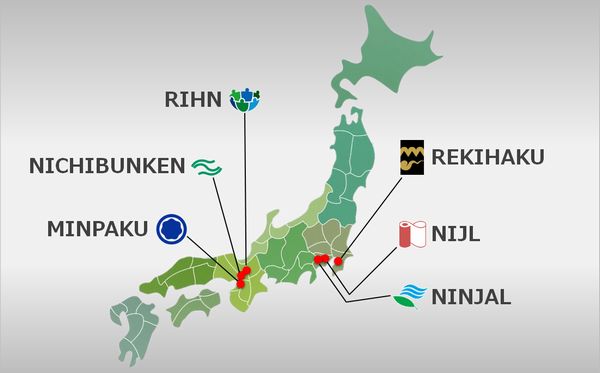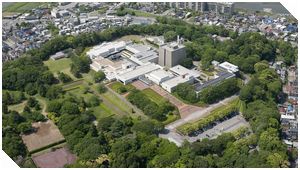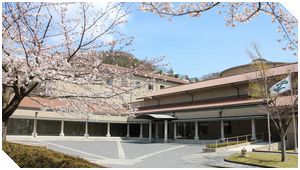NIHU's six institutes

国立歴史民俗博物館(REKIHAKU)

The National Museum of Japanese History (Rekihaku) is a museum-based interuniversity research institute established to advance research on Japanese history and culture. Its vision is to offer historical perspective that will open the way to the future, and to enhance mutual understanding among people with divergent perceptions of history. In pursuing the vision above, Rekihaku values its research style (museum-based research integration) in which resources, research, and exhibitions are organically linked and presented through sharing and public access.
Rekihaku will promote interdisciplinary collaborative research with researchers in Japan and overseas as well as initiatives involving multidisciplinary cooperation towards developing a new field of Japanese history.
国文学研究資料館(NIJL)

The National Institute of Japanese Literature (NIJL) is a comprehensive scientific research institution specializing in Japanese literature. Its activities include: collection of literary texts and other related documents on a large scale from all over Japan; provision of the same materials for use by researchers working across a wide range of fields related to Japanese literature; and active promotion of advanced collaborative research projects utilizing these materials. Drawing upon its scholarly achievements in documentary research on premodern Japanese texts, a body of accomplishment built up over the 50 years since the institute's founding, NIJL works with research institutions and researchers both in Japan and abroad to make the most of premodern Japanese texts as a rich intellectual resource, and is committed to paving the way for innovative research spanning a variety of different fields.
国立国語研究所(NINJAL)

The National Institute for Japanese Language and Linguistics (NINJAL) is a core international research facility engaged in research into Japanese language, linguistics and Japanese language education. Its aim is to maintain an overview of the characteristics of Japanese in the context of world languages, and its universal nature and linguistic diversity. In addition to staying involved in large-scale collaborative research with universities and research institutions in Japan and overseas, NINJAL provides the results of its research for joint use as a resource for language research, in an effort to advance and internationalize Japanese language research, and promote the development of new areas of research.
国際日本文化研究センター(NICHIBUNKEN)

The International Research Center for Japanese Studies (Nichibunken) is an institution whose aim is to conduct comprehensive research, both scholarly and international in nature, on Japanese culture and to assist researchers specializing in Japanese studies around the world.
As part of its core team research activities, the center sets out themes that span different disciplines and approach Japanese culture from an international perspective, and involves researchers from a wide range of specialist fields in Japan and overseas. In addition to hosting a large number of overseas research scholars every year, Nichibunken acts as an international hub for research on Japanese culture, through activities such as organizing international symposiums and forums, facilitating academic exchange, and gathering and disseminating research data.
総合地球環境学研究所(RIHN)

The Research Institute for Humanity and Nature (RIHN) examines global environmental issues in the context of the relationship between humanity and nature. In this perspective, environmental problems are always linked to human culture. The institute conducts comprehensive research with the aim of resolving these issues. RIHN research is conducted through international research projects, each of which identifies appropriate themes, methods and other research resources that can be developed within a given time frame. RIHN also emphasizes working with local residents and other stakeholders, as well as the wider research community. Such qualities distinguish RIHN from other environmental research institutions in Japan.
国立民族学博物館(MINPAKU)

The National Museum of Ethnology (Minpaku) is an inter-university research institute of cultural anthropology, providing postgraduate education and managing one of the worldʼs largest museum facilities. As a focal point for international research, collaboration and shared access, the museum works with peoples, societies and cultures the world over, accumulating cultural resources and disseminating ideas and information through exhibition and publications. Minpaku has been constructing an online "Info-Forum Archives" to enable researchers and source communities to exchange information related to cultural resources of the world, and create a new knowledge of humanity.
